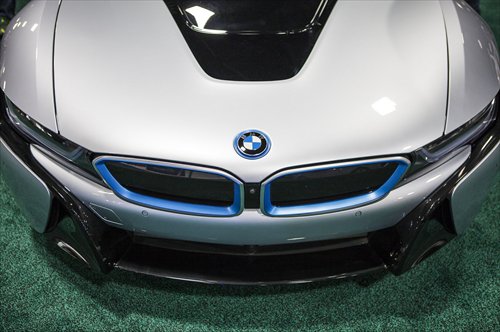BMW makes waves with WeChat ad campaign
Move signals start of more targeted methods of advertising

A BMW car Photo: CFP
German premium automaker BMW became a hot topic of conversation recently following an advertisement posted on the hit instant messaging app WeChat.
On January 25, WeChat, owned by China's Internet giant Tencent Inc, launched its first batch of targeted ads. Clients include BMW, Coca-Cola and domestic smartphone maker Vivo.
The advertisement soon became a hot topic among frequent WeChatters, who number over 470 million at present. The BMW ad became something of a status symbol, as those targeted by the BMW ad are presumed to be wealthier than users who received the Vivo promotion.
"One of my WeChat friends even posted a screenshot of the BMW ad he got," said Yu Yin, a 30-year-old white-collar worker in Beijing, told the Global Times Tuesday.
Those who received the Vivo or Coco-Cola ads mocked themselves as "diaosi" - the Chinese equivalent of "loser."
Surveys from some IT news portals show that the BMW ad was mostly sent to WeChat users who use Apple smartphones and who live in first- and second-tier cities - the demographic more likely to be able to afford a BMW car.
Tencent said that people's speculation over the criteria for the targeted ads was groundless, according to an e-mail statement sent to the Global Times on Monday, but did not reveal how the recipients were chosen.
A spokesperson for BMW told the Global Times Tuesday that so far the company is satisfied with the results of the campaign. In the first 17 hours after the WeChat ad was launched, it reached 46 million WeChat users and 7 million of them have responded to the ad. Also, 200,000 followers were added to BMW's official WeChat account, according to the spokesperson.
The targeted ads mark WeChat's first attempt to make profits out of the popular app. This in itself is a major piece of news, so it is no wonder that the BMW campaign has received widespread attention, analysts said.
"BMW is smart enough to have caught the first wave, but I doubt that later promotion campaigns on WeChat can be as successful," Shi Jie, editor-in-chief at industry portal auto.gasgoo.com, told the Global Times on Monday.
Wu Shuocheng, an analyst at auto industry consultancy Menutor Consulting Shanghai Co, said that with the mobile Internet further gaining popularity, automakers' promotional campaigns will become much more diversified. "And promotions using mobile Internet are expected to be more targeted, as they will be able to find the right demographic through user behavior analysis," Wu said.
Poor taste
But there have also been downsides for BMW. In the WeChat promotion campaign, the premium auto brand once again became associated with the term "tuhao," as people think that only the "tuhao" group can get the BMW WeChat ad. "Tuhao" refers to rich people with poor taste. Anyone who received the BMW ad found themselves in danger of being mocked as a "tuhao" by their friends.
"It is not a good thing for BMW to be associated with 'tuhao,' as it may affect people's purchasing choices," Wu noted.
BMW and Land Rover owners are more generally associated with the "new rich" group, who are more eager to show off their wealth, according to a survey from Shanghai-based Hurun Research Institute. In comparison, BMW's rival brand Mercedes-Benz has been linked to people who are considered successful and rich entrepreneurs, while Audi tends to remind people of government officials, it said.
New promotions
As competition in the auto sector heats up, promotional campaigns are becoming increasingly innovative.
In one notable phenomenon in China in the past two years, automakers have begun sponsoring popular TV reality shows to promote their new products, as reality shows have started gaining popularity in the country and usually target young audiences.
The most recent case is the promotion of the new Lamando from Shanghai Volkswagen, the joint venture between the German automaker and Shanghai-based SAIC Motor. By sponsoring the hit outdoor reality show Running Man, which began airing on Zhejiang Satellite TV in October, the model gained widespread attention even before its official launch in January.
As well as details of the model being showcased in the show, JJ Lin, a Singaporean pop star who took part in the show and who also endorses Lamando, even wrote a song for the car, which was sung on one episode.
Another case is Infiniti, the premium brand under Japanese auto brand Nissan. Infiniti became a household name after it sponsored the reality show Where are we Going, Dad? which aired on Hunan Satellite TV in 2013. Sales of Infiniti also saw faster growth after the promotional campaign.
"Such an innovative promotion could certainly increase people's interest for a new car," Wu said. "But eventually, good product quality and convenient distribution channels are more important factors for people to make purchases."